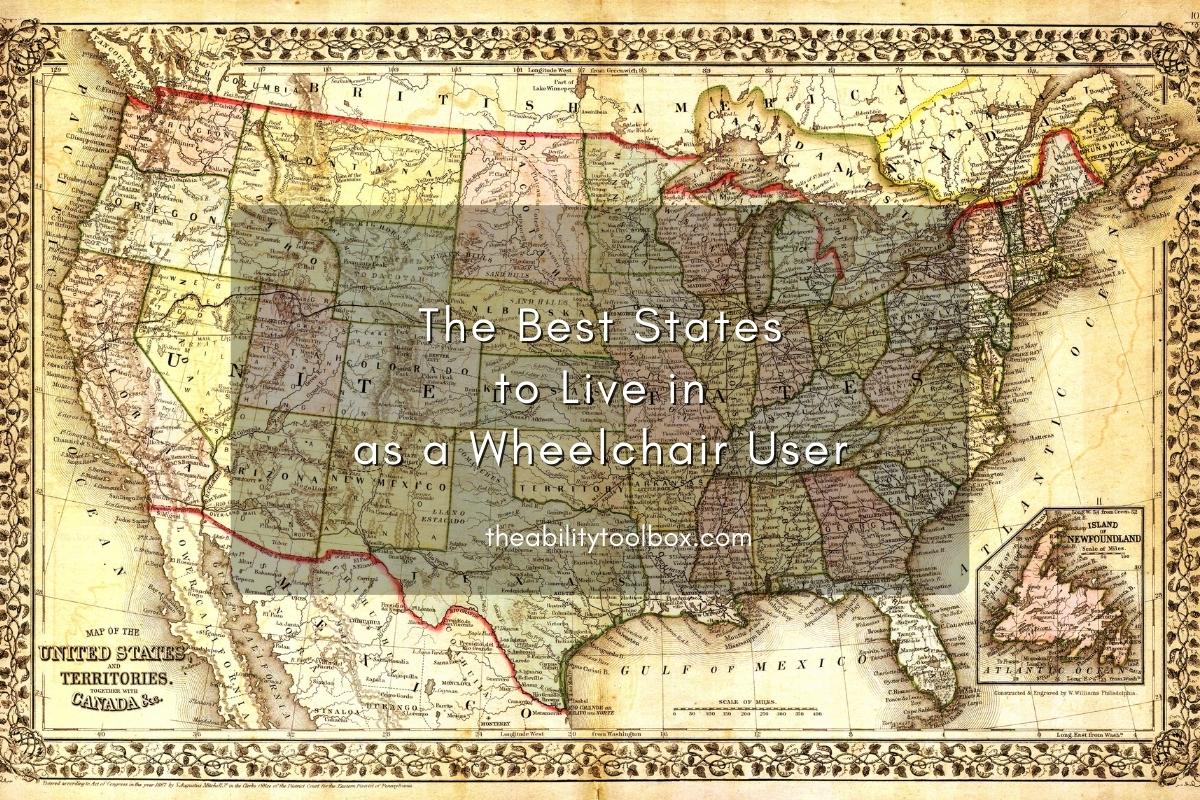
If you have a disability and use a wheelchair, these are the best U.S. states to live in for accessibility, healthcare, and weather.
How We Chose the Best States for Wheelchair Users
There are a million guides to the best places to live if you have a disability, so what makes ours trustworthy? Well for starters, we actually asked the disability community. We polled peer experts in our Facebook groups and on-site support groups regarding accessible places to live and the quality of disability services. I also used my own experiences as a disabled travel blogger who has visited numerous states and can attest to their accessibility (or lack thereof).
Next, we evaluated the states people suggested based on several key amenities: accessibility, healthcare, home care/personal care services, weather, the impact of climate change, and cost of living. We chose states that prioritize accessible buildings and transportation, and allow people with disabilities to work and buy into Medicaid rather than being forced into poverty.
The Ability Toolbox exists to compile this kind of collective knowledge from our peer experts to share with the disability community. We also know that people have different priorities and programs and services in a state can change. That means we will update this guide if we learn about another state with great services, or if a state on this list isn’t everything we thought it would be.
Without further ado, here are the best states to live in if you use a wheelchair.
Best Healthcare Access for Wheelchair Users: Massachusetts
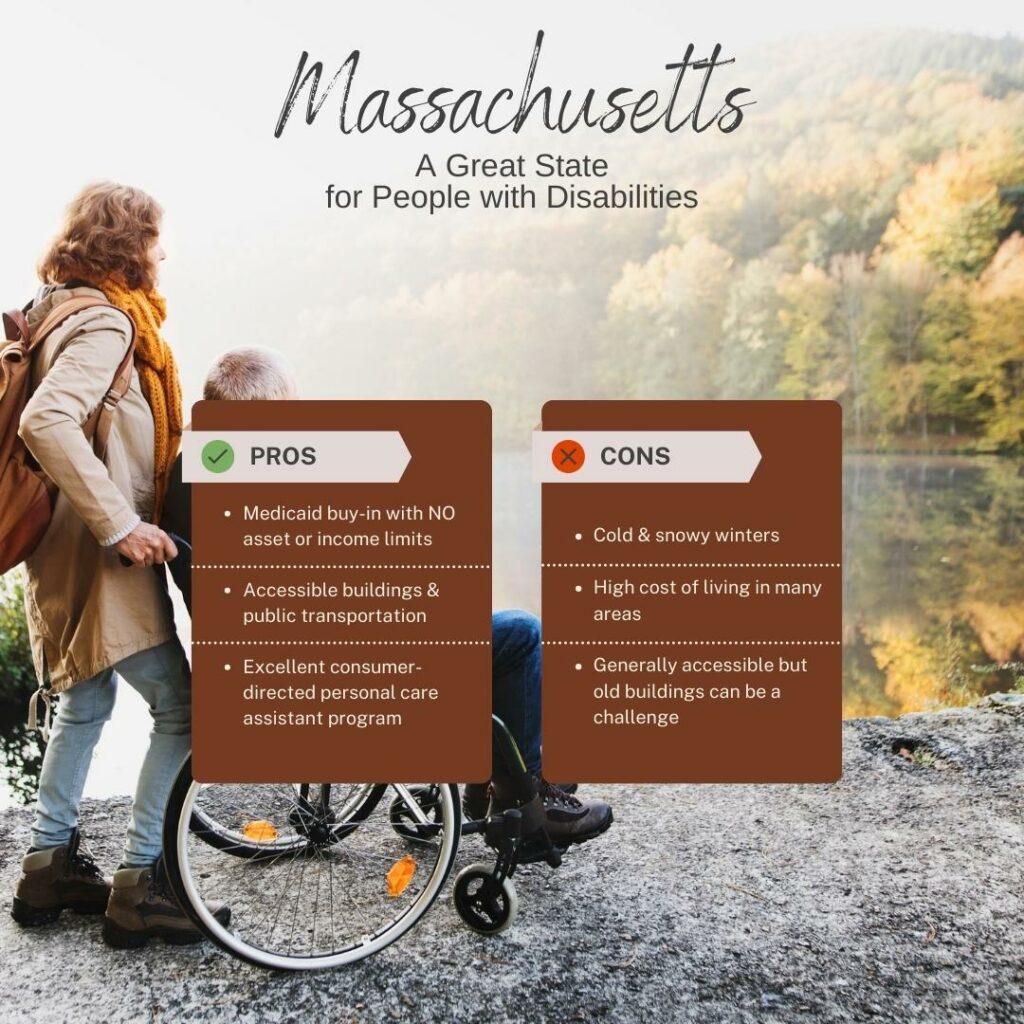
If you’re looking for a state that values healthcare accessibility for its residents, Massachusetts is where you want to be.
The Upsides
Healthcare: Massachusetts is home to many of the best universities in the country, and has world-class medical care for people with complex or rare diseases. MassHealth, the Massachusetts universal healthcare program, was the model for the Affordable Care Act — but is better in many ways. In Massachusetts, any disabled adult can enroll in MassHealth CommonHealth, the state’s Medicaid buy-in program, regardless of their income and assets. Instead of losing Medicaid when you make “too much money,” you simply pay a sliding-scale premium.
Home Care: Due to MassHealth CommonHealth, Massachusetts is one of the only states in which people with disabilities who need personal care attendants are not forced into some degree of poverty. You can choose and manage your own caregivers and they’ll be paid by the MassHealth PCA program. Those who need it can get up to 24-hour care. However, PCA pay is set by the state and is low relative to the cost of living.
Accessibility: Massachusetts is one of the original 13 colonies, so it has many old buildings and cities. Yet despite these challenges, wheelchair accessibility is generally good in Massachusetts. Boston has made tremendous strides in improving its public transportation, and the vast majority of subway and commuter rail stations are now wheelchair accessible. Massachusetts has a strong disability advocacy community to ensure that accessibility remains a priority in the state.
The Downsides
Weather: Massachusetts has long winters, with over 40 inches of snow per year in major cities such as Boston. Although most municipalities do a good job of clearing the roads, getting around in a wheelchair when it’s cold and icy is not ideal.
Cost of Living: Massachusetts has a fairly high cost of living, especially in Boston. However, you may be able to find an affordable home in more rural areas.
Our Verdict
Massachusetts is the best state to live in if you are a wheelchair user who works or has financial assets and makes too much money to qualify for Medicaid anywhere else. You won’t be forced into poverty just because you have a disability and need home care or other services that are only available through Medicaid. However, the weather is a major downside, and the cost of living can be an issue in some areas.
Best Disability Services: Colorado
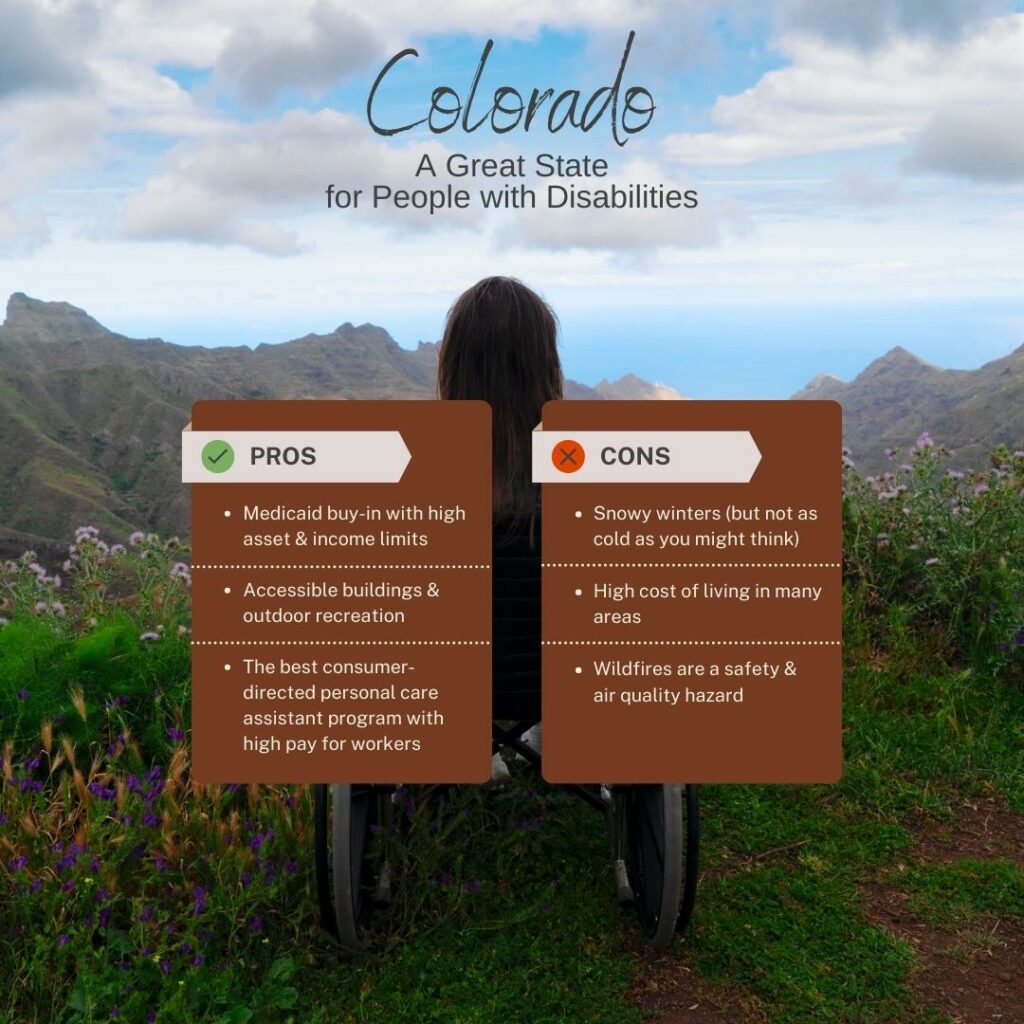
If you need personal care aides to help with dressing, bathing, and household tasks, Colorado wins for the best Medicaid home and community-based services — and it’s not even close.
The Upsides
Accessibility: The vast majority of businesses in Colorado, especially in Denver, are wheelchair accessible. Coloradans love the outdoors, so accessible trails, adapted skiing, and nature-related activities abound. Colorado has a long history of disability rights advocacy and a strong disability community. Denver even has Phamaly, a theatre company made up of performers with disabilities. However, Colorado is car-centric, so public transportation may not quickly get you everywhere you need to go.
Healthcare: Colorado has a Medicaid buy-in program that allows disabled people who work to earn over $11,000 per month with a sliding-scale premium. It also has no asset limit.
Home Care: Through the Colorado CDASS program, you can hire the person(s) you choose to help you with tasks such as dressing and bathing. Colorado is one of the only states where you can choose how much to pay your caregivers, up to $48 per hour if you need skilled care. That is by far the highest wage available in the country.
Weather: People imagine Colorado as being cold and dreary, but it’s actually sunny most of the year, with average high temperatures of nearly 50 even in January and February. Humidity is low, so you won’t get that swampy feeling when you sit outside during the summer.
The Downsides
Cost of Living: Everyone wants to live in Colorado now, so in the last 10 years, the cost of housing has increased exponentially. This has led to an increase in people experiencing homelessness and long waiting lists for affordable housing.
Climate Change: As a result of climate change, rain and snow have decreased in Colorado, leading to a major surge in wildfires. Wildfires have destroyed homes in the areas surrounding Denver and can make air quality hazardous to people with disabilities and chronic illnesses.
Weather: Blizzards can happen, but in Denver, snow rarely sticks for more than a few days, and roads are plowed quickly. Still, winter weather is a factor to consider.
Our Verdict
Colorado is the best state to live in if you are a wheelchair user who needs many hours of home care services. It’s also excellent if you work or have too much money to qualify for Medicaid in other states. And if you ever encounter inaccessibility, you’ll have a strong disability community to advocate alongside you. However, wildfires have become a serious problem, and snowy winters can keep you indoors occasionally. And most crucially, due to the housing shortage and rising cost of living, you must have housing arranged before you move, or you could end up homeless.
Best Weather for Wheelchair Users: California
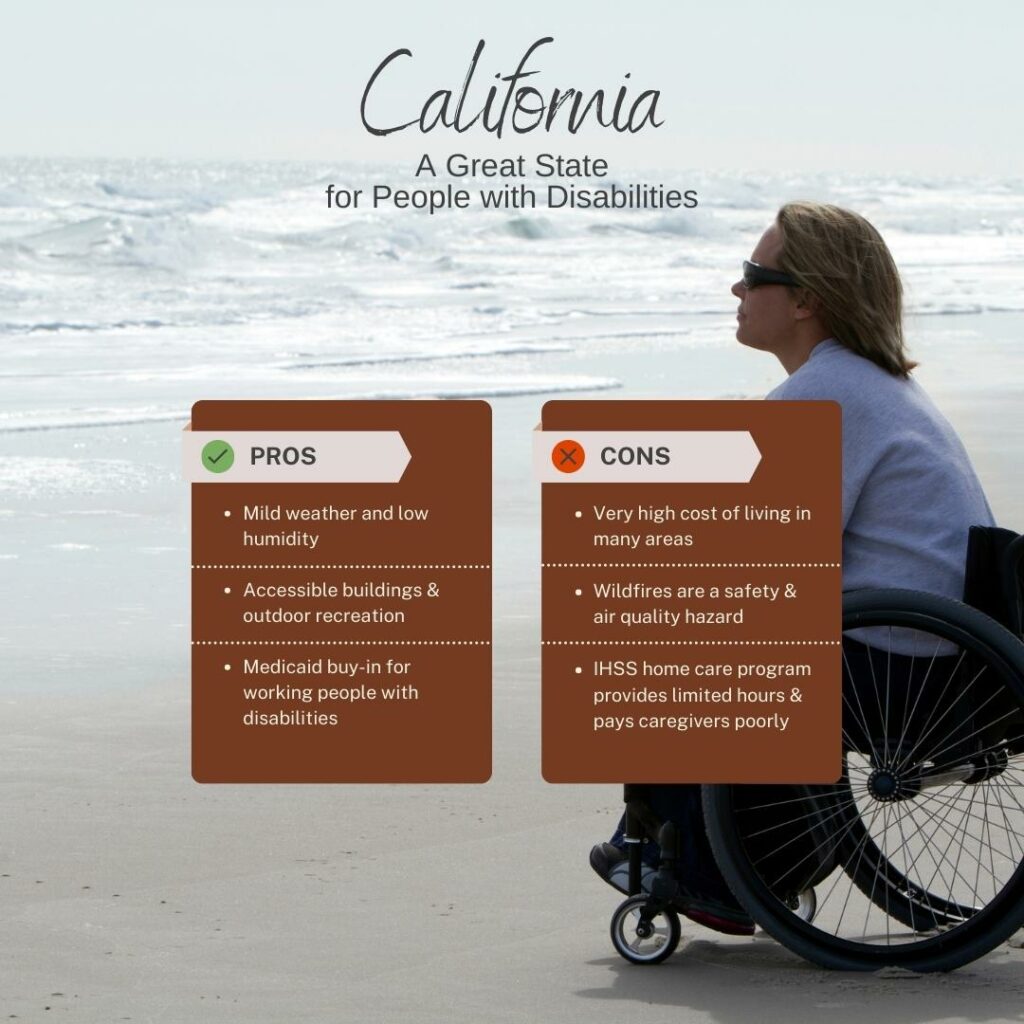
If you love sun, mild weather, and being able to go just about everywhere without having to research wheelchair accessibility first, California is the place for you.
The Upsides
Weather: California has the best weather in the United States for wheelchair users. It doesn’t snow in many parts of the state, and it’s fairly dry with rainfall only occurring during a few months of the year. Although Southern California can have some very hot days during the summer, as they say, it’s a dry heat. It always cools down at night, so if you have trouble with the summer heat, you can go out in the evening.
Accessibility: California is very wheelchair accessible. Nearly all businesses have wheelchair ramps and accessible restrooms. The state has its own enhancements to the ADA that impose civil penalties for violations, which means businesses can face expensive lawsuits if they don’t comply. From beaches to museums to sporting events, you can enjoy endless indoor and outdoor accessible activities. However, California is car-centric, so although the public transportation is accessible, it won’t always get you where you want to go in a timely manner.
Healthcare: California has many of the most renowned hospitals and specialists in the country, so if you have a rare or complex condition, it’s a great place to live. California has a Working Disabled program that will allow you to earn up to 250% of the federal poverty level and keep Medi-Cal (Medicaid). However, that amount is not enough to live well in most of the state.
Home Care: California has the largest personal care aide program in the country, IHSS (In-Home Support Services). With IHSS, you can get up to 285 hours of care per month… In theory. In practice, people who need lots of care struggle to get enough hours and frequently cite ableist and toxic caseworkers as the problem. The pay varies by county but it is extremely low relative to the cost of living. On the positive side, overtime hours are allowed, and parents can get paid for caring for minor children with disabilities, which isn’t permitted in many other states. Overall, IHSS is a good program for people who need a low-to-medium amount of care and/or have a family member who can assist them.
The Downsides
Cost of Living: You probably already know that California is one of the most expensive places to live in the country. There’s a major shortage of affordable housing and a high population of homeless people, many of whom have disabilities. Crime has been rising and sidewalks and public transportation aren’t as safe as they used to be.
Climate Change: Years of drought in California have led to frequent wildfires, some of which have decimated suburban areas and small towns, leading to significant loss of life. Even if you live outside a fire risk area, air quality can be a major issue during fire season, especially if you have asthma or breathing difficulties.
Our Verdict
California is the most physically accessible state in the country and has amazing weather. However, the high cost of living and somewhat limited home care services create significant barriers to thriving in the Golden State as a wheelchair user.
Best Affordable State for Wheelchair Users: Minnesota
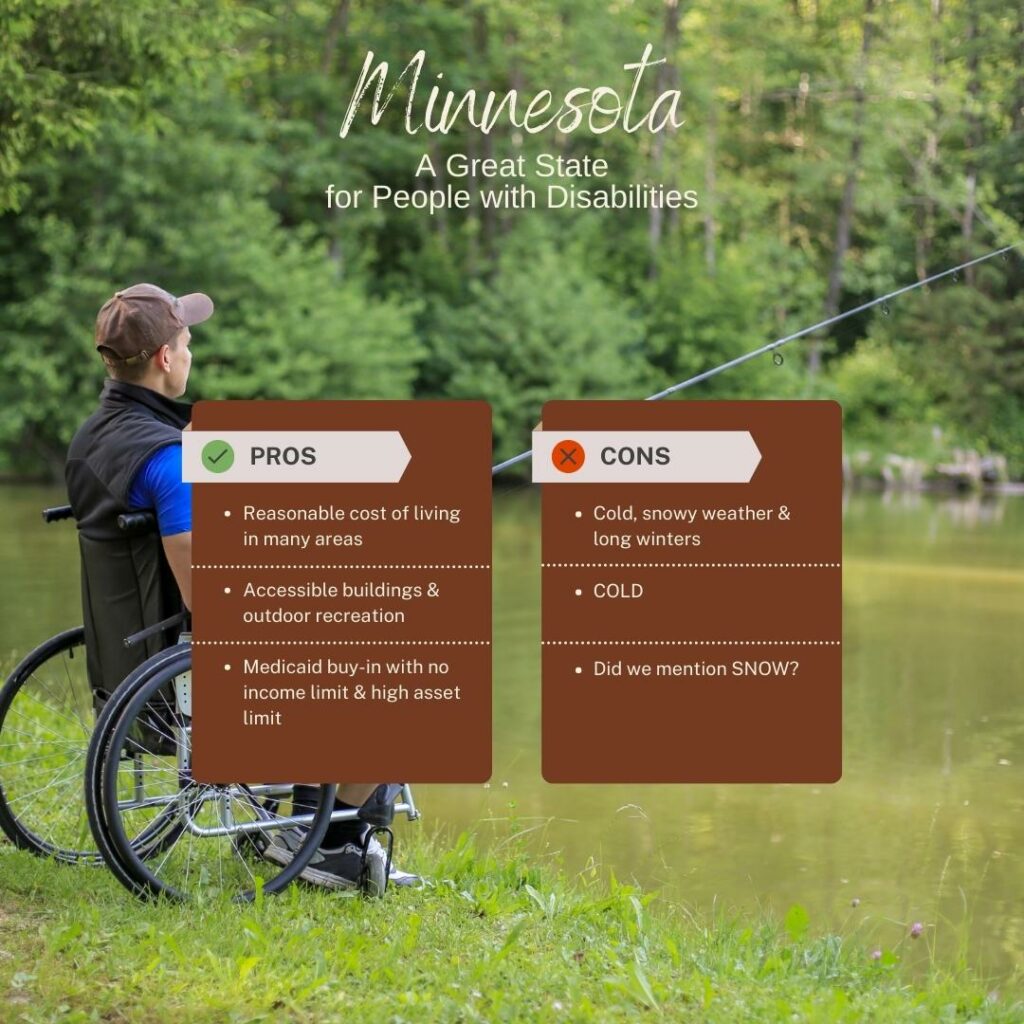
If you’re a wheelchair user who is looking for a more affordable place to live with friendly people and excellent disability services, bundle up and head to Minnesota.
The Upsides
Cost of Living: Minnesota is affordable compared to other states with good disability services. Of course, some parts of Minneapolis/St. Paul can be pricey, but you’re more likely to find reasonably-priced housing in a safe neighborhood compared to other large cities. And if you live in a small city or college town, the cost of living is even lower.
Accessibility: The Minneapolis/St. Paul area is very wheelchair accessible, with numerous attractions to enjoy including museums and theaters. The rail system is fully wheelchair accessible, as are the buses. If you enjoy the outdoors, Minnesota has dozens of accessible trails and a wonderful state park system. The Department of Natural Resources also has a tank wheelchair rental program so you can explore trails that wouldn’t usually be considered accessible.
Healthcare: Minneapolis has an excellent hospital system with specialists who can address your medical needs. Minnesota has a Medicaid buy-in program for employed people with disabilities that has no income limit, a fairly high asset limit, and retirement accounts are allowed, so you won’t be forced into poverty.
Home Care: Minnesota has an excellent self-directed home care program with higher pay for caregivers than many states, and you can get 24-hour care if needed.
The Downsides
Weather: What’s the first thing you think of when you hear the word “Minnesota”? Chances are it’s “snow” or “cold” — and that reputation is well-deserved. Minnesota has long, cold winters with lots of snow. It’s a lot to cope with if you’re a wheelchair user, and a major reason not to move to Minnesota.
More Great States to Consider as a Wheelchair User
In some cases, it may not be possible for you to move to the states listed above. Perhaps you need to be closer to family, live in certain areas due to a loved one’s career, or the cost of moving is an issue. If you need to move a long distance, for example, if you live on the East Coast and intend to move to California, you may want to work with coast-to-coast relocation, which could save money and reduce the stress of planning a move. If none of the states listed above are quite right for you, or you’re looking for additional options, here are more great places to live as a wheelchair user.
Washington is the only other state besides Massachusetts and Minnesota that does not have income or asset limits for its Medicaid buy-in program for working disabled people.
Washington, D.C. has outstanding wheelchair accessible public transportation, especially the Metrorail system.
Connecticut has an excellent Medicaid buy-in program for working people with disabilities that allows you to earn up to $75,000 per year and have retirement accounts plus up to $10,000 in assets (and more if placed in an ABLE account).
New York has a strong self-directed home care program, CDPAP, which will authorize 24-hour care if needed, and a Medicaid buy-in program that will allow you to earn over $70,000 per year from work. However, the state is far behind the rest of the country when it comes to accessible buildings, sidewalks, and transportation.
But wait, don’t pack your bags yet! Be sure to check out our article on what to consider before moving when you have a disability.
In your experience, what are the best states to live in for wheelchair users?
Share your thoughts with our community in the comments.
Founder and Editor-in-Chief of The Ability Toolbox. I received my BA in English from Stanford University and MA in Clinical Psychology from Antioch University Los Angeles, and have worked in entertainment and health media for over 20 years. I also blog about traveling with a disability. As a wheelchair user with cerebral palsy, I am deeply committed to amplifying the voices of the disability community through writing and advocacy.








